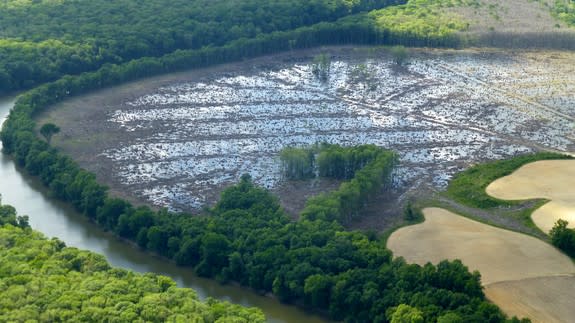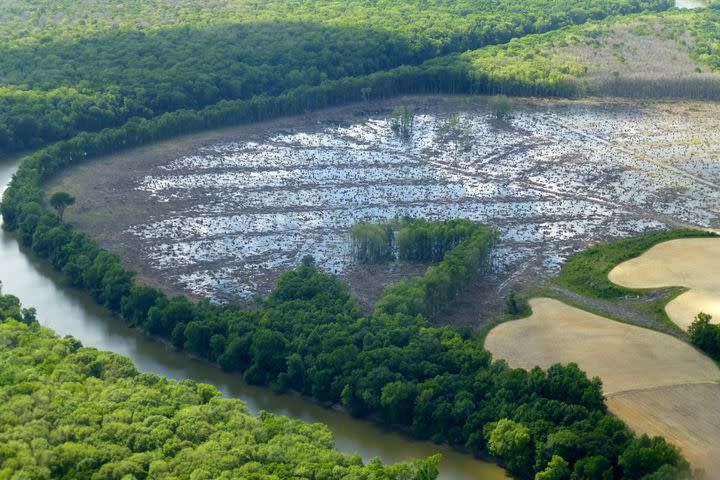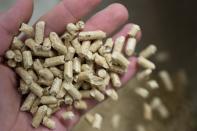Pruitt's EPA will now classify burning wood as 'carbon neutral,' baffling scientists (among others)

Under a new Environmental Protection Agency (EPA) policy unveiled on Monday, burning forest products, known as biomass, will now be considered a "carbon neutral" fuel source.
The EPA's action, which EPA administrator Scott Pruitt announced before an audience of Georgia timber industry leaders, for now settles the question of whether chopping down trees, turning them into wood pellets, and then shipping them to power plants where they're burned for fuel will be counted as a renewable source of fuel like solar panels or wind turbines.
SEE ALSO: Here's a running list of all the Scott Pruitt scandals
This action comes before the agency's own Scientific Advisory Board could decide on how to account for the emissions of carbon dioxide, which is the main long-lived greenhouse gas responsible for global warming. Proponents of this policy, such as Pruitt, argue that regrowing forests after they are cut down absorbs carbon dioxide, and therefore balances out the emissions from cutting down and burning trees in the first place.
“Today’s announcement grants America’s foresters much-needed certainty and clarity with respect to the carbon neutrality of forest biomass,” Pruitt said in a press release.
While Pruitt and other proponents of counting wood-derived bioenergy as carbon neutral are right that trees grow back, and can become net absorbers, or “sinks,” of carbon again, the problem involves a mismatch in timescales. A forest that’s been cut down for wood pellets that are burned in a power plant in England, for example, might take 100 years to grow back to its full carbon absorbing potential. During that time, more carbon dioxide emissions would’ve caused global warming to worsen, with irreversible impacts.

Image: Photothek via Getty Images
Globally, forests absorb about one-third of annual human-caused carbon emissions, and in the U.S. that figure is about 11.2 percent, the EPA said. Cutting forests and burning them for energy would reduce that amount of absorption at a time when countries are struggling to cut emissions steeply enough to limit global warming to well below 2 degrees Celsius, or 3.6 degrees Fahrenheit, above preindustrial levels by 2100.
In fact, a report last year from the UK-based Chatham House think tank found that, when emissions and carbon absorption are fully accounted for, along with the emissions from transporting wood pellets to power plants, bioenergy involves about as much carbon emissions as coal. Burning wood to produce steam for electricity may even be 50 percent more carbon intensive than coal per unit of electricity produced, the report found.
According to William Moomaw, a scientist specializing in forests' role in climate change at the Fletcher School of Law and Diplomacy at Tufts University, the EPA's decision was made with "zero consultation" with agency scientists or its Science Advisory Board. "It's pretty amazing," he said, of the process that went into the policy announcement.
The EPA decision gives a boost to U.S. foresters that are clear-cutting forests to export wood pellets to Europe, which is the largest market for bioenergy. It also clears the path for more wood-burning within the U.S.
"Between this and the Europeans it means no chance of staying within the 2-degree limit," Moomaw said in an interview, "It's just not possible."
"It's a bad idea because anything that has carbon in it produces carbon dioxide when you burn it," he said. "This is horrific."
In a statement, Andres Villegas, the president and CEO of the Georgia Forestry Association said that EPA's announcement, "Reflects the clear scientific consensus on forest biomass.”
“The Agency’s recognition of biomass as a renewable, carbon neutral source of energy will maintain and enhance markets for small-diameter trees, which encourages landowners to invest in forest health, and ultimately, to keep their land in trees," Villegas said.

However, the lack of consensus on the EPA's own Science Advisory Board indicates how controversial bioenergy policies are in the scientific community, with many researchers sharing Moomaw's view that forests should be left intact, and renewables such as solar and wind should be encouraged instead.
Scientists and environmentalists who oppose the new policy say that there are few guarantees that landowners will maintain the land in such a way to allow forests to grow back to the exact state they’re in today, and in fact climate change itself may make that impossible to do.
The scale of the bioenergy trade is growing, however. The British alone are spending about $1 billion a year to import wood pellets from the U.S., and are counting it as a carbon neutral form of energy, Moomaw said. The U.S. has been exporting about 5 million tons of wood pellets per year, mostly from forests in Georgia and the Carolinas.
Moomaw pointed out that even if the forests regrow, by the time they will again be absorbing comparable amounts of carbon dioxide to today's intact forests, it will be too late for the climate.
"If it regrows and we did get to climate neutrality sometime maybe 100 years from now the climate would have irreversibly changed a number of things," he said. "The carbon dioxide in the air will have warmed the planet... When the tree regrows the glacier doesn't regrow," he said. "The climate change effects are irreversible."
"Carbon neutrality is not climate neutrality."
Related Video: White House Support for EPA's Pruitt Waning
Watch news, TV and more on Yahoo View.
WATCH: Apple's recycling robot rips apart old iPhones to recover valuable materials







